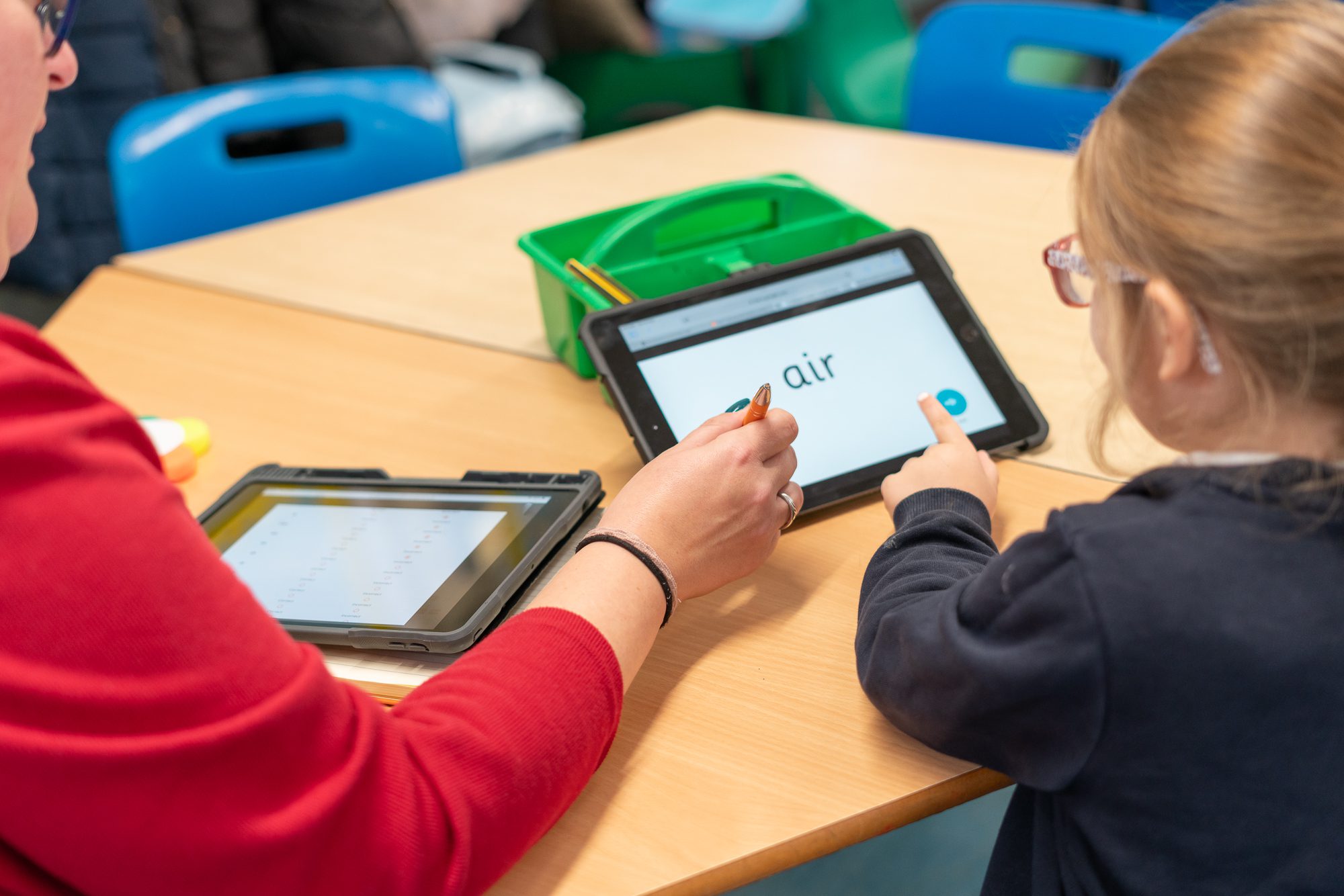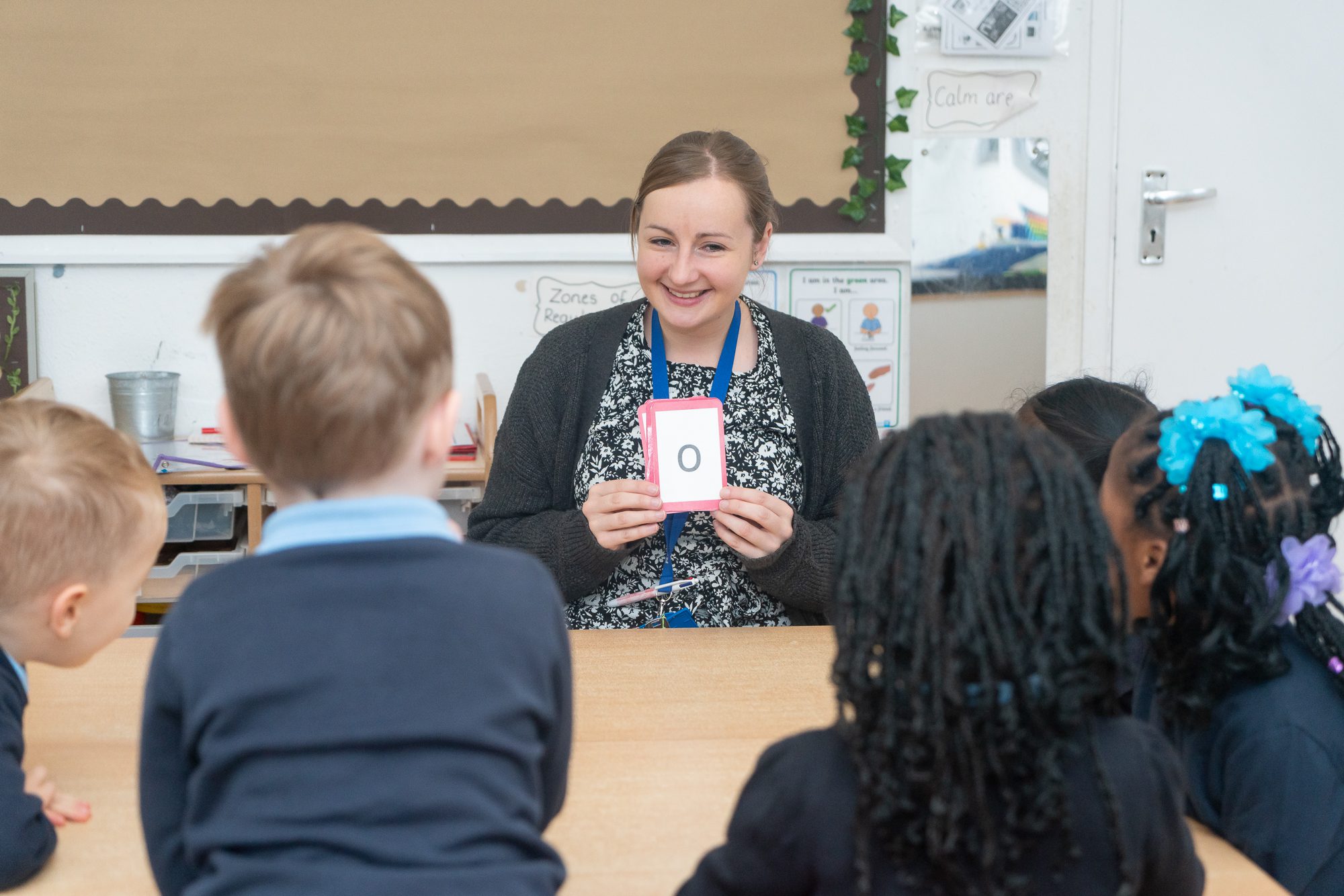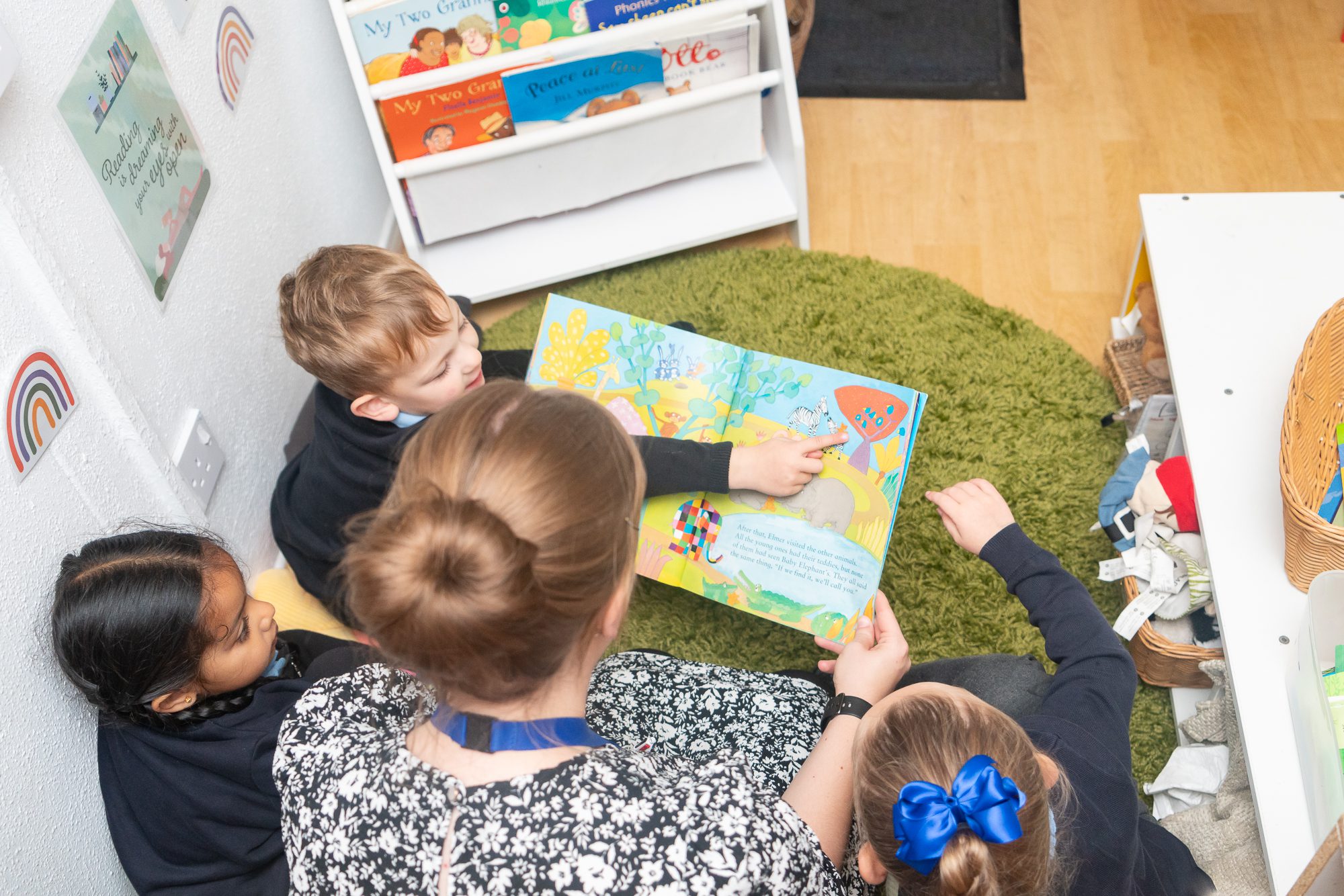Phonics Subject Leader: Miss C Collcutt
At Rosherville Academy, Phonics is taught using the structure of our systematic synthetic programme ‘Little Wandle Letters & Sounds’.

Intent
We use the Little Wandle Letters and Sounds Revised to plan and provide daily engaging phonics lessons.
In phonics, we teach children that the letters of the alphabet represent different sounds and that these can be used in a variety of combinations and are put together to make words. The children learn to recognise all of the different sounds and combinations that they might see when they are reading or writing. Our phonics teaching starts as soon as the children start in Reception and follows a very specific sequence that allows our children to build on their previous phonic knowledge and master specific phonic strategies as they move through school.


Implementation
In Reception and Y1, children follow the progression within Little Wandle Letters and Sound Revised programme. Phonics is taught daily and there is a review session on a Friday.
Phonics starts in reception in week 2 to ensure the children make a strong start.
By the end of the reception, children will have been taught up to the end of phase 4.
By the end of year 1, children will have been taught up to the end of phase 5.
Reception lessons start at 10 minutes, with daily additional oral blending – increasing to 30 minutes as soon as possible.
Y1 lessons are 30 minutes long.
In Y2-Y3, phonics lessons are taught daily to children where appropriate – following the model of Little Wandle but plugging specific gaps identified through assessment.
We build a language-rich environment where we ensure all children have access to fiction, non-fiction, rhymes and poetry. Our teachers have an excellent knowledge of children’s literature and have carefully chosen high-quality texts for our children to become familiar with and enjoy listening to and reading both at school, and at home with their families. These texts are intentionally chosen to support our curriculum themes of exploration, global responsibility, creativity, sense of self, comparison, and service to develop pupils’ vocabulary, language comprehension and a love of reading.
Impact
We aim that all our children are able to tackle any unfamiliar words that they might discover. At Rosherville we also model these strategies in shared reading and writing both inside and outside of the phonics lesson and across the curriculum. We have a strong focus on the development of language skills for our children because we know that speaking and listening are crucial skills for reading and writing in all subjects.
We want to take every opportunity possible to enhance the cultural capital of our learners to equip them with the knowledge and experiences needed for society and the desire to aspire and achieve social mobility whatever their starting point. One way in which we promote cultural capital via reading is by providing and exposing our children to a range of texts, from different genres, that have been written by authors from a wide range of backgrounds to promote cultural and moral learning.
We are determined that every pupil will learn to read, regardless of their social and economic circumstances, their ethnicity, the language spoken at home, special educational needs or disabilities. We have uncompromising strategies for supporting, reinforcing and accelerating the reading of individual children, particularly those who are falling behind.

Phonics in Each Stage
In Reception and year 1, at the end of each week, there is a review session that recaps the learning. There are also whole review weeks (pre-planned and bespoke review weeks to address gaps identified by the class teacher’s ongoing formative assessment). Children identified in Reception and Y1 as in danger of falling behind are immediately identified and daily ‘keep up’ sessions are put in place – sessions follow the Little Wandle Letters and Sound Revised programme.
In Reception and year 1, the children are assessed at the end of every half-term using the Little Wandle Letters and Sounds Revised assessment tracker.
Children across reception apply their phonics knowledge by using a fully matched decodable reader in a small group reading practice session. These sessions are 15 minutes long and happen three times a week. There are approximately 6 children in a group. The sessions follow the model set out in Little Wandle Letters and Sounds Revised. The children then take the same book home the following week to ensure success is shared with the family. These sessions start in week 4. Children who are not decoding, do a little blending lesson, following the model set out in Little Wandle Letters and Sound Revised.
In Reception and year 1, at the end of each week, there is a review session that recaps the learning. There are also whole review weeks (pre-planned and bespoke review weeks to address gaps identified by the class teacher’s ongoing formative assessment). Children identified in Reception and Y1 as in danger of falling behind are immediately identified and daily ‘keep up’ sessions are put in place – sessions follow the Little Wandle Letters and Sound Revised programme.
In Reception and year 1, the children are assessed at the end of every half-term using the Little Wandle Letters and Sounds Revised assessment tracker.
The children in Y1 sit the Phonics Screening Check in the summer term.
Children who do not pass the Phonics Screening Check in Y1 will re-sit this in Y2.
Children across year 1, and year 2 (and beyond if appropriate) apply their phonics knowledge by using a full matched decodable reader in a small group reading practice session. These sessions are 15 minutes long and happen three times a week. There are approximately 6 children in a group. The sessions follow the model set out in Little Wandle Letters and Sounds Revised. The children then take the same book home the following week to ensure success is shared with the family.
Rapid Phonics is a unique intervention program that includes 56 decodable and age-appropriate fiction and non-fiction reading books for the children to build their confidence and help them read accurately, quickly, and with expression.
Key features:
- Clear sequencing of phonemes/graphemes
- Dyslexia-friendly fonts which are well-spaced and sized just right
- Repetition of the target phoneme/grapheme
- Inclusion of high-frequency sight words
- Continuous text
SEND Information
Our SEND and disadvantaged pupils are given the necessary support in class to fully access the supported Phonics curriculum. Learning is adapted where necessary to support SEND/EAL pupils to give equal opportunities for all to be confident in approaching any problems faced. Interventions, support and challenges are constantly revised and adapted to ensure all children are supported in achieving learning. The above areas are robustly and continuously monitored to ensure any gaps in learning are addressed.
Phonics Assessments
Phonics Screening Check
Children in Year 1 throughout the country will all be taking part in a Statutory Phonics Screening Check in June. Children in Year 2 will also take the check if they did not achieve the required result when in Year 1 or if they have not taken the test before. The phonics screening check is designed to confirm whether individual children have learnt phonic decoding and blending skills to an appropriate standard.
What Happens During the Screening?
The test contains 40 words. Each child will sit one-to-one and read each word aloud to their teacher. The test will take approximately 10 minutes per child, although all children are different and will complete the check at their own pace. The list of words the children read is a combination of 20 real words and 20 pseudo words (nonsense words). The pseudo words will be shown to your child with a picture of an alien. This provides the children with a context for the pseudo word which is independent of any existing vocabulary they may have. Pseudo words are included because they will be new to all pupils; they do not favour children with a good vocabulary knowledge or visual memory of words. We prepare children by introducing them to ‘alien’ words throughout their daily lessons using sounds that they have learnt. The pass mark last year was 32/40.
KS2 – Phonics
If the children need further support in their Phonics when they move into KS2, they will be put in an intervention that is tailored to them.
Home Learning
We understand the significance of parents and carers in supporting their children to develop both word reading and comprehension skills, so we endeavour to build a home-school partnership which enables parents and carers to have the confidence to support their children with reading at home.
Any children that have been identified through assessment as falling behind are identified quickly for daily small group or individual catch-up sessions to ensure that they catch up quickly. Parents are informed when their children are falling behind and are given resources to help support their children at home.
If you are a parent and would like more information about how to support your child with phonics at home, please follow this link to find the Reception and Year 1 overview as well as videos of the sound pronunciations, letter formation sheets, and other helpful resources.

